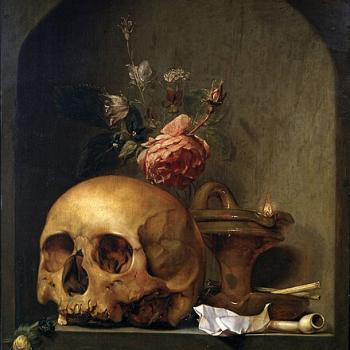In addition to numerous helpful exercises and capstone rituals for each of the five sections, the book is peppered with inspirational quotes from a wide variety of sources, and several extended anecdotes from a group called the "Wise Council" whose constituent individuals are profiled toward the end of the book. Amongst these Wise Councilors is the Patheos.com Pagan Channel's own Crystal Blanton from the "Daughters of Eve" blog. While these insights and examples from others are used effectively, Thorn's work is very much based in her own experiences, which she details at various points, including experiences of burnout and failure. These were extremely encouraging for me to read, not because of some sense of schadenfreude, but because Thorn has been something of an eminent "Pagan superstar" over the past few years whom I have admired greatly. Even superstars can't shine 24/7—and that's okay!
While I still want to push myself harder, and know that I can stand to be challenged more in many respects in my own work, life, and spiritual journey (all of which are different regions of the same territory, in any case), it is also useful to know that exemplary individuals fail, have bad days, and have ongoing troubles. The disarming honesty of Thorn's accounts of difficulty and failure inspire compassion, not only for Thorn's work and that of others, but most especially for myself. This is an invaluable and important lesson that needs to be emphasized, reviewed, and revisited for most of us, I suspect.
Two further things (amongst many possible) in this book were outstanding and deserve further mention here. In Part I, "To Know," chapter 2 is on "Needs, Wants, and Desires." This chapter alone is worth the price of the book (and far more!), and should be required reading for spiritual seekers in every tradition; in fact, I'd go as far as saying that it should be required reading for every graduating high school student. As a culture, we in the United States are painfully under-educated in discernment over the differences between needs, wants, and desires, and this brief chapter goes a very long way in helping to clarify those matters considerably. (As a potential further project for the future: the issue of discernment arises throughout the book, but it does so especially poignantly in this chapter. A fuller exploration of the act of discernment might be a good study to undertake soon, perhaps collaboratively in concert with a variety of spirit-workers, spiritual directors, theologians, philosophers, and other practitioners within the modern Pagan and polytheist religious communities.)
There was also a section in a later chapter on the importance of realizing how privileged one is if they are able to be doing this kind of deep self-reflective work at all: if you are reading this review, or are reading the book itself, you have a certain amount of privilege in many respects. As a person who is disabled, partially employed, and part of a gender and sexual minority, it is very easy for me to forget how lucky I am to be able to even admit those things publicly or to spend time on religion and self-development work at any level. There are (too) many who are far less well-off than I am, even though I'm aware of a great many who are also far better-off than myself as well. Thorn did a session on privilege in modern Paganism at PantheaCon in one of the hospitality suites (described here), which I didn't know about until it was over; but, again, having read her discussion of this in the book went some way toward making me feel as if I had not missed out.
As I stated previously, it is very hard to find any major faults or matters to critique in this book. Being critical comes naturally to me, and I am still finding it difficult to do so. I offer the following very minor points for further consideration, not as critiques, but instead simply as possible areas for increased awareness or attention in the future.
Theologically, I am polytheist, and not a monist. Thorn identifies as a "non-dual polytheist," but I did not see very much polytheism in this book, and there would have been ample opportunity to have introduced it, if desired. There are goddesses and gods and other divine beings that could be easily correlated as potential allies and exemplars for any of the Four Powers of the Sphinx (e.g., Angerona, the Roman goddess of silence, for the power To Keep Silent). It is possible that reference to various deities was left out simply to make this book more palatable to a wider religious and spiritual readership than modern Pagans and polytheists, a practical choice under the circumstances. Several portions of the book, particularly toward the end, go into what I would consider more monistic excursions than would be appealing or necessary according to my own tastes. I don't think having them there detracts, by any means, though polytheists who have an extreme monism allergy might better be warned of this before proceeding.





